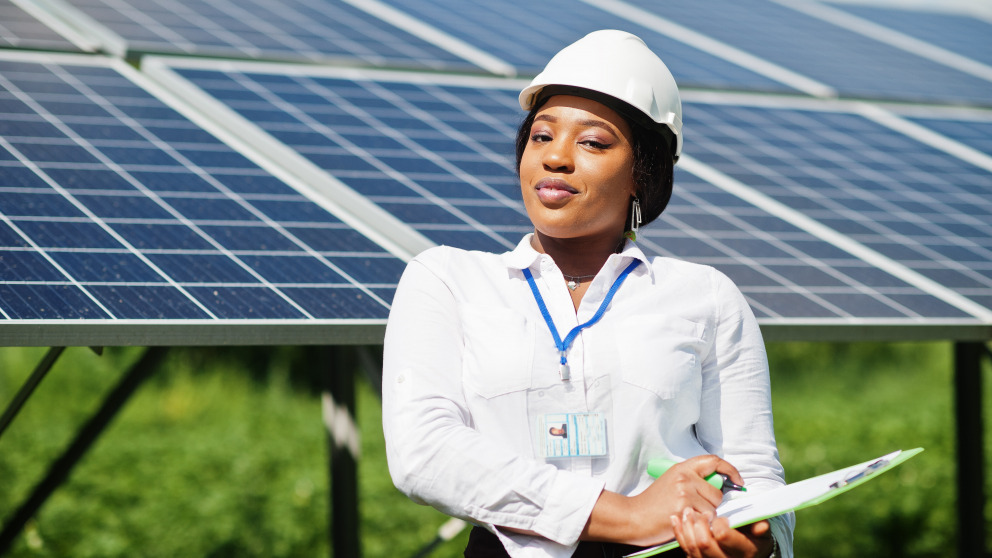Invigorating South Africa’s Deal to Phase Out Coal-Fired Power
19.01.2022
In Glasgow, Germany pledged 700 million euros to support South Africa’s efforts to phase out coal-fired power. But to secure South Africa's coal phase-out without economic and socioeconomic losses, a regional and national plan must provide for a Just Transition. The COBENEFITS team at the Institute for Advanced Sustainability Research (IASS) has presented an analysis on decarbonisation that makes data-based recommendations for action in South Africa's coal mining hub, Mpumalanga.

The study of COBENEFITS shows that renewables can make a substantial contribution to counterbalancing the loss of jobs in the coal industry. But gender equality remains a problem: Currently, only 14 per cent of workers in the renewables sector are women, a percentage even lower than in the coal industry, as previously unpublished industry data show.
South Africa’s partnership on the path to decarbonisation
In November 2021, South Africa entered into a partnership with France, Germany, the EU, the UK and the US to support the decarbonisation of its economy. Industrial nations pledged around 8.5 billion USD to close coal-fired plants and stimulate a socially just energy transition with new jobs.
The South African Department of Forestry, Fisheries and Environment (DFFE) estimates that about 80 to 90 per cent of emissions reductions will come from the energy sector. This sector is both the largest emitter and the sector where emissions reductions are cheapest due to falling renewable energy prices. Without forward-looking planning, however, South Africa's coal phase-out is likely to result in economic and socioeconomic losses. To prevent this from happening, a regional and national plan is needed to ensure that the Just Transition is socially inclusive, provides decent work for all, and reduces poverty.
This brought the authors to the question: How can provincial and national stakeholders harness the social and economic co-benefits of building a low-carbon, renewable energy system while facilitating employment opportunities, building a regional industrial sector, and enabling skill-development and gender-inclusive career pathways?
Unpublished data from energy providers
For the study, the team analysed previously unpublished data from South Africa's energy giant Eskom on the qualification levels and gender distribution of employees in coal mines and power plants. The data set enables analysis of the skills and gender balance in the coal industry and assessment of the potential for transferring expertise to the renewable energy sector. The personal data were anonymised and evaluated in compliance with a non-disclosure agreement.
Interviews were also conducted with managers to understand barriers and opportunities for women in the renewable energy sector. Based on these data sets and economic modelling, the study analyses and quantifies the socioeconomic implications of converting coal-fired plants to renewable energy.
Mpumalanga – from coal to renewables
Mpumalanga is the centre of South Africa's coal industry, accounting for about 80 per cent of total coal production. The new co-benefits study highlights opportunities for this province to become a clean energy hub. It stresses that the jobs lost in the coal sector can largely be replaced by jobs in the renewable energy sector.
But for this to happen, there must be local opportunities for value creation. Investments in renewable energy that are linked to the development of local industries are needed. Moreover, the transition from fossil fuels to renewables offers the chance to improve the situation of women employed in the energy sector. The analysis shows that women are still highly underrepresented.
According to coal mining operator Eskom and the Mining Quality Authority (MQA), female employment is 31 per cent within Eskom and 21 per cent in coal mining. Yet, overall, female employees tend to be more highly skilled than their male counterparts – 67 per cent of women compared to 49 per cent of men at Eskom, for example, have a post-matric (higher) qualification. As a result, women occupy more senior positions despite their underrepresentation. In the renewable energy sector, the gender ratio in South Africa is even worse: Here, women make up only 14 per cent of the workforce.
How can women be supported to meet the new needs of the renewable sector during this transitional phrase?
A list of promising measures
Based on the study results and surrounding discussion sessions with political and knowledge partners, the authors propose focusing on areas where policy and regulations could be introduced or enforced. The study presents data which underline the conditions necessary to fully harness all these benefits.
Nine recommendations for fair and inclusive decarbonisation in South Africa's Mpumalanga coal region:
- Implement policies enabling renewable energy development in Mpumalanga to avoid net job losses.
- Regional procurement with annual build targets to create sustained employment and continuous transfer of skills.
- Developing and expanding the transmission grid to facilitate renewable energy investments in Mpumalanga and elsewhere.
- A coordinated approach for localisation and value creation from renewable energies to develop a green provincial economy.
- Build on South Africa’s manufacturing strengths to diversify the production of components in country.
- Dedicate Special Economic Zones (SEZs) for the manufacturing of key components to push the clean energy industry in the province.
- Establish renewable energy skill-development programmes through TVET colleges to facilitate career opportunities for many.
- Childcare facilities nearby training centres to reconcile parenting responsibilities and career development.
- Entrepreneurial development for women to open access to markets and networks.
The socioeconomic and social potentials of renewable energy for South Africa highlighted above, and the recommendations to make the coal phase-out just and inclusive, can help invigorate the multilateral partnership to support the decarbonisation of the South African economy. Germany can contribute to this process by building on established political dialogue formats within the framework of the German government's International Climate Initiative and the German-South African Energy Partnership.
Publication:
David Jacobs, Sebastian Helgenberger, Laura Nagel: From coal to renewables in Mpumalanga: Employment effects, opportunities for local value creation, skills requirements, and gender-inclusiveness. Assessing the co-benefits of decarbonising South Africa's power sector, IASS/IET/CSIR (January 2022) DOI: 10.48481/iass.2022.002

